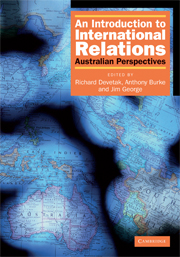Book contents
- Frontmatter
- Contents
- List of tables, figures and boxes
- List of contributors
- Preface and acknowledgments
- An introduction to international relations: the origins and changing agendas of a discipline
- 1 Theory and practice in Australian international relations: the search for identity and security
- Part 1 Theories of international relations
- Part 2 The traditional agenda: states, war and law
- 10 The modern state and its origins
- 11 Nationalism and war
- 12 Security
- 13 Arms control
- 14 The changing character of warfare
- 15 The ethics and laws of war
- 16 International law
- 17 International society and european expansion
- 18 Order and decolonisation in Southeast Asia
- 19 The cold war
- Part 3 The new agenda: globalisation and global governance
- Glossary of terms
- Bibliography
- Index
- References
17 - International society and european expansion
from Part 2 - The traditional agenda: states, war and law
- Frontmatter
- Contents
- List of tables, figures and boxes
- List of contributors
- Preface and acknowledgments
- An introduction to international relations: the origins and changing agendas of a discipline
- 1 Theory and practice in Australian international relations: the search for identity and security
- Part 1 Theories of international relations
- Part 2 The traditional agenda: states, war and law
- 10 The modern state and its origins
- 11 Nationalism and war
- 12 Security
- 13 Arms control
- 14 The changing character of warfare
- 15 The ethics and laws of war
- 16 International law
- 17 International society and european expansion
- 18 Order and decolonisation in Southeast Asia
- 19 The cold war
- Part 3 The new agenda: globalisation and global governance
- Glossary of terms
- Bibliography
- Index
- References
Summary
Introduction
This chapter examines the evolution of international society through European expansion. It considers, first, the nature of international society: does such a society exist? What are its features? What purpose does it serve? And does it have the requisite unity to act as an agent in international relations? The discussion here draws upon the work of the English School which pioneered the notion of international society. Second, the differing approaches to international society taken by solidarism and pluralism will be navigated. Third, the history of international society through colonialism and decolonisation will be charted, revealing the neglected story of an ongoing capacity for ‘international society’ to colonise the space of non-liberal states. Such a capacity throws up a challenge to international society to act as a standard bearer for countries that continue to be subjugated to the interests of greater powers.
International society
‘International society’ is a central term and focus of the English School (see Box 17.1). It is used to refer to both an influential concept and an actual society of states that is fundamental to world politics. This distinction matters because it is very easy to slip between these two meanings when thinking about international society; the concept doesn't easily correspond to how the world is actually constituted. Bearing this in mind, international society as an actual entity in world politics involves two stories; one of which is familiar and the other neglected.
- Type
- Chapter
- Information
- An Introduction to International RelationsAustralian Perspectives, pp. 201 - 212Publisher: Cambridge University PressPrint publication year: 2007

